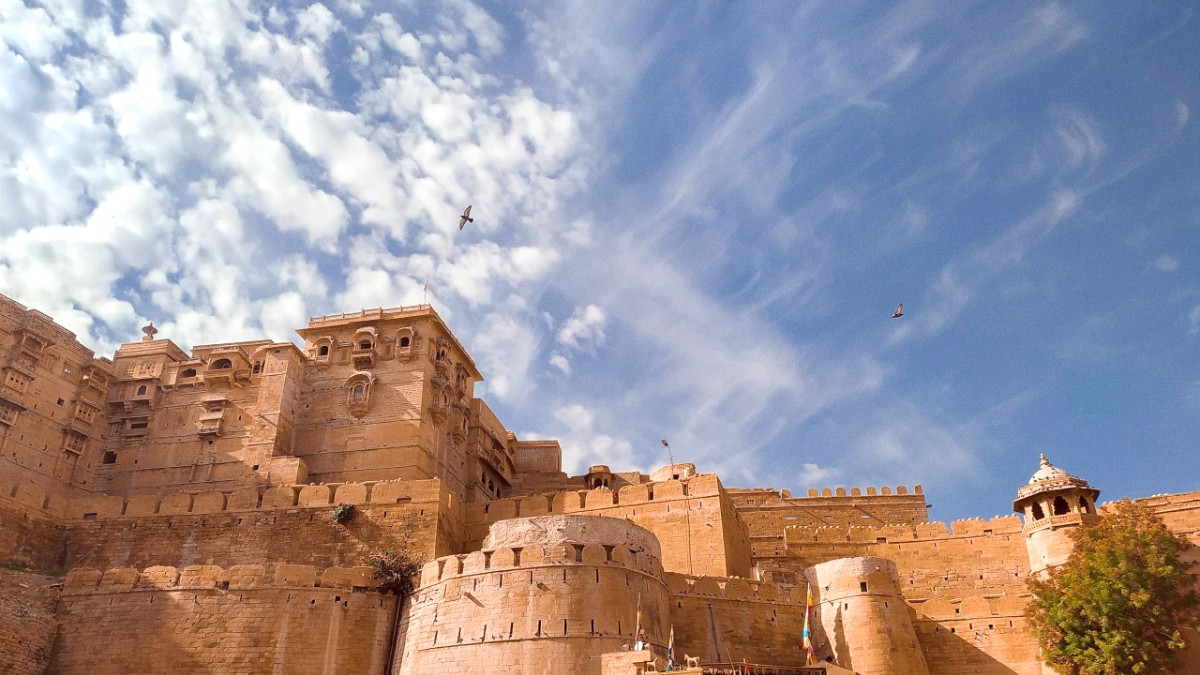
Rajasthan, India
The most popular day trip destination, Sam Sand Dunes, rests about 28 miles (45 km) west of Jaisalmer. Vast stretches of shifting sand dunes define this location, presenting opportunities for camel safaris, jeep safaris (dune bashing), and desert camping. This is the quintessential desert experience. Kuldhara Abandoned Village, approximately 11 miles (18 km) southwest of Jaisalmer, holds an eerie and historically significant past, abandoned overnight by the Paliwal Brahmins in the 19th century. Its deserted houses and quiet lanes paint a haunting glimpse into history. Bada Bagh, approximately 4 miles (6 km) north of Jaisalmer, presents a historical garden complex featuring royal cenotaphs (chhatris) of Jaisalmer's Bhatti rulers. It radiates a peaceful atmosphere and invites stunning photography, especially at sunrise or sunset. Tanot Mata Temple, about 75 miles (120 km) from Jaisalmer and near the India-Pakistan border, stands under the management of the Border Security Force (BSF). It holds deep significance due to its alleged protection during the 1965 and 1971 Indo-Pak wars, serving as a pilgrimage site and an unique border destination.
For Sam Sand Dunes, Kuldhara, and Bada Bagh, private taxis or auto-rickshaws (for closer sites like Kuldhara and Bada Bagh) serve as transport. The typical method for Sam Sand Dunes is an organized desert safari tour, which includes transport and activities. Jeeps navigate the dunes for bashing activities. Tanot Mata Temple calls for a private taxi or an organized tour, given its distance and border proximity. Public transport options for this trip remain limited and inconvenient.
The desert landscape itself serves as a main draw for excursions from Jaisalmer.
Jeep safaris from Jaisalmer explore the unique desert ecosystem of the Desert National Park. The park presents chances to view the specialized flora and fauna of the Thar Desert, marking a distinct wildlife experience.
Sam Sand Dunes and Khuri reveal the quintessential Thar Desert landscapes. They reveal vast stretches of shifting sand dunes, ideal for photography, especially at sunrise or sunset when colors unfold dramatically.
Beyond the city, discover more of Rajasthan's cultural depth.
Kuldhara Village presents an unique cultural and historical insight into the Paliwal Brahmin community and the mystery surrounding their sudden abandonment.
Many desert safari packages incorporate visits to traditional Rajasthani villages like Khuri or Kanoi. These visits present opportunities to experience local life and observe traditional crafts, offering an authentic cultural interaction.
Tanot Mata Temple, a significant pilgrimage site, holds particular importance for Indian military personnel due to its wartime history, blending spirituality and patriotism.
Observe traditional mud houses and villagers engaged in traditional crafts. These experiences offer a understanding of local desert life.
The Tanot Mata Temple's history intertwines with military events, creating a pilgrimage site with national pride. Its story is one of wartime resilience.
Jaisalmer naturally forms a part of a wider Rajasthan itinerary.
Adding 1-2 days to your itinerary to visit Jodhpur is a popular choice. Travel takes approximately 5-6 hours by train or bus. Explore Mehrangarh Fort, Jaswant Thada, and wander through the blue lanes of the old city. Jodhpur features a distinct desert city charm.
Consider adding 1-2 days for Bikaner. Travel takes approximately 5-6 hours by train or bus. Visit Junagarh Fort, a magnificent structure, and the Karni Mata Temple, renowned for its rats. Bikaner presents a distinct desert atmosphere.
Adding 2-3 days for Udaipur is an option, involving an overnight train or a long bus journey (10-12 hours). Explore the stunning City Palace, take boat rides on Lake Pichola, visit Jag Mandir, and experience cultural shows. Udaipur contrasts sharply with Jaisalmer's desert landscape.
Jaisalmer forms part of Rajasthan's "Desert Circuit" with Jodhpur and Bikaner. It also connects effectively to the "Golden Triangle" (Delhi, Agra, Jaipur) via train or flight to Jaipur or Delhi, positioning it as a logical stop on a broader India tour.
A comprehensive Rajasthan itinerary starts from Delhi, then Jaipur, Pushkar, Udaipur, Jodhpur, Jaisalmer, Bikaner, and finally returns to Delhi. This loop typically spans approximately 2-3 weeks, encompassing diverse cultural and geographical aspects of Rajasthan.
Jaisalmer readily integrates with the classic Golden Triangle route (Delhi, Agra, Jaipur), serving as an ideal extension for a rich cultural journey across North India.
Custom routes incorporating wildlife safaris (Ranthambore) or additional cultural immersion in smaller towns can also be arranged, tailoring the trip to specific interests.